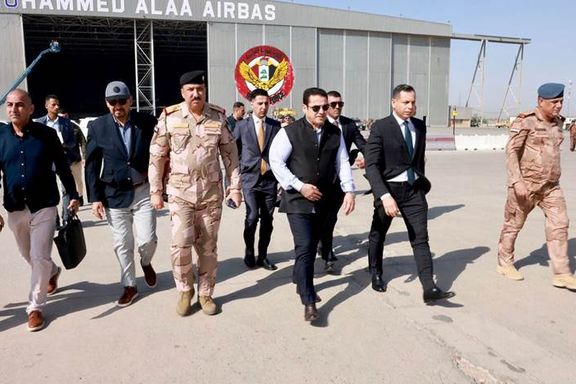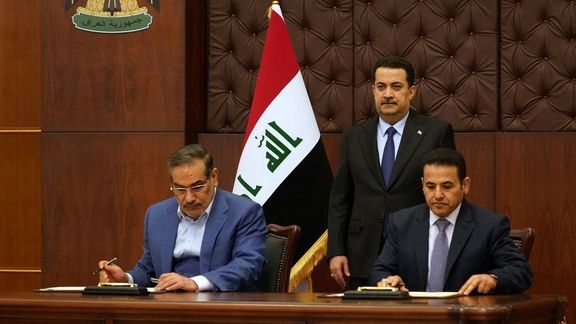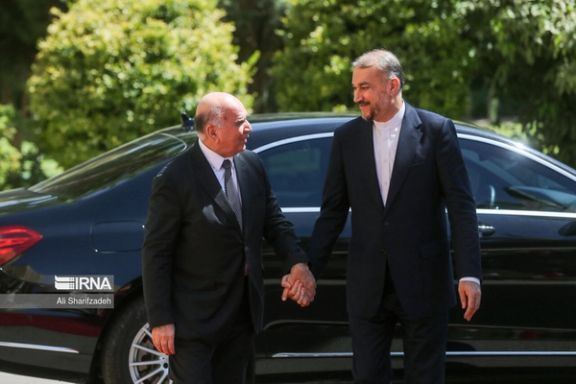Iraq’s Security Chief In Erbil Ahead Of Iran’s Deadline To Kurdish Groups

Iraq's top security official is in the Kurdistan autonomous region to oversee the implementation of a security pact with Iran aimed at disarming Kurdish opposition groups.

Iraq's top security official is in the Kurdistan autonomous region to oversee the implementation of a security pact with Iran aimed at disarming Kurdish opposition groups.
National security advisor Qasim al-Araji, leading a high-level security delegation, arrived in Erbil, the capital of Iraqi Kurdistan, on Monday, just a day before the September 19 deadline for finalizing the disarmament agreement.
Back in March, during a ceremony attended by Prime Minister Mohammed Shia' Al Sudani in Baghdad, then-Secretary of Iran’s Supreme National Security Council (SNSC), Ali Shamkhani, and his Iraqi counterpart al-Araji signed a joint security cooperation document aimed at curtailing the activities of Iranian-Kurdish militants.
The Kurdistan Regional Government (KRG), which has cordial relations with Tehran, has on several occasions called on neighboring countries and armed Kurdish groups to not use the region’s territory as an arena to settle scores. In July, the Iranian military threatened military action if Iraq failed to meet the deadline.
Tehran has long accused the Kurdistan Regional Government (KRG) of harboring opposition groups labeled as "terrorist" or "anti-revolutionary" and permitting them to use border areas as launchpads for attacks against Iran. These groups claim that their armed campaign aims to "defend the rights of the Kurds" in Iran. The Iranian regime has escalated attacks against Iranian Kurds sheltering in Iraqi Kurdistan, citing "separatist" Kurdish groups as instigating conflict in Iranian Kurdish cities by supporting popular protests.

Al-Araji visited Tehran last week "under the direction of the Commander-in-Chief of the Armed Forces, Iraqi Prime Minister Mohammed Shia’ al-Sudani," to discuss tightening security at the border between the two countries. This visit came several days after the Islamic Republic's warnings that cross-border attacks would continue unless Baghdad and Erbil secured the borders. In recent weeks, he has been shuttling between Sulaymaniyah, Erbil, Tehran, and Baghdad to coordinate this effort.
During a joint press conference with his Iranian counterpart Hossein Amir-Abdollahian in Tehran on September 13, Iraqi Foreign Minister Fuad Hussein announced that several groups had already been disarmed, and arrangements were being made to set up camps at an undisclosed location for the relocation of these groups.
Waad Qado, a member of the Iraqi parliament’s security and defense committee, stated on Monday that Iraq had requested an extension of the deadline. Iranian Defense Minister Brigadier General Mohammad Reza Ashtiani, however, said on Sunday that Tehran would not extend the ultimatum, warning Baghdad of an "eleventh-hour decision" on the matter.

"We do not have any extension [to the deadline]. We will act in due time in accordance with the agreement made [with Iraq]," he said, warning Baghdad of a last-minute assessment of the situation before making the final decision.
The spokesman for Iraq’s Joint Operations Command also said on Sunday that government forces have begun to gain full control over all border points with neighboring Iran, emphasizing that Baghdad is fully committed to implementing the agreement. Major General Tahsin al-Khafaji added, "The step is meant to prevent the use of Iraqi soil to launch an attack on neighboring states, as emphasized in the Iraqi Constitution."
Earlier this month, the ground forces of the Islamic Revolutionary Guard Corps (IRGC) deployed forces to the northwestern borders of Iran.
In general, Kurdish parties, including Komala and the Kurdistan Democratic Party of Iran (KDPI), favor Kurdish autonomy within a federal Iran. On the other hand, Pejak (the Free Life Party of Kurdistan), an affiliate of the Kurdistan Workers’ Party, or PKK, which originated in Turkey but is also based in northern Iraq, generally advocates for a unified, independent Kurdistan uniting Kurds in Syria, Iraq, Turkey, and Iran.